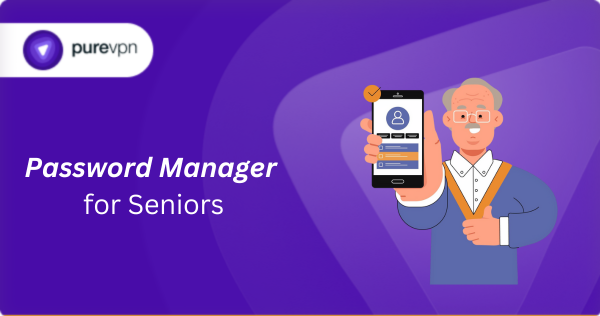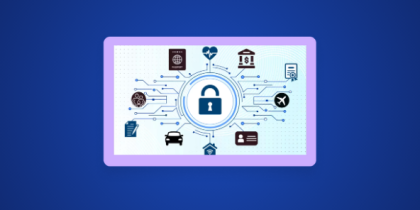Managing passwords can be a real headache. The average person juggles dozens of logins for email, banking, shopping, healthcare portals, and social media. For seniors, this challenge is even greater. Writing them down feels risky, reusing the same password is unsafe, and constantly resetting forgotten logins is exhausting.
That’s where a password manager for elders helps, keeping everything for you secure and making sign-ins effortless. In this guide, we’ll explore why the elderly have a difficult time managing logins, reasons password books aren’t recommended, and how a password manager is the best solution for their problem.

What is a Password Manager for Seniors?
A password manager is a simple yet powerful tool that securely stores all of your login details in one encrypted vault. Instead of trying to remember dozens of different passwords, seniors only need to remember one strong master password. They help you by:
- Saving usernames and passwords for all accounts.
- Autofilling login information across websites and apps.
- Generating strong passwords so you don’t reuse old passwords.
- Syncing across devices like computers, tablets, and smartphones.
A password manager for seniors handles the frustrating parts of remembering passwords, keeping your data safe, and also preventing password fatigue.
Why Are Passwords Harder to Manage as We Get Older?
Password management gets harder with age, and you’re not alone in feeling that way. Here’s why it feels extra challenging as we get older:

- Too Many Accounts
Between online banking, streaming, email, healthcare portals, and social media, many seniors are juggling 20 to 50 accounts. As one Redditor pointed out, trying to keep all those logins straight gets overwhelming.
- Memory Challenges
Names, symbols, passwords with capitals, numbers—it’s a lot to remember! Research shows that short-term memory and cognitive load make recalling multiple complex passwords increasingly difficult as people age.
- Tougher Security Demands
Today’s websites often require strong passwords: mixed case letters, symbols, numbers, a certain length. It’s good for safety, but it adds friction, especially when you’ve got to create or remember something new each time.
- Avoiding Repetition Feels Easier, but Risky
Reusing the same password everywhere feels simpler (we’ve all done it), but many online discussions warn that once one site is breached, hackers will try that same password elsewhere, making password reuse dangerous.
A password manager for seniors takes these headaches off your plate by securely storing, generating, and filling passwords so you don’t have to. More on that later on.
Reasons a Password Book is a Bad Idea for Seniors
A lot of seniors still use a password notebook or sticky notes. While it may feel like a safe option, it’s actually one of the riskiest habits, because:
- A misplaced notebook could give strangers access to every account.
- Anyone in your home (visitors, repair workers, even caregivers) could glance at it.
- If the book is destroyed or lost, your passwords are gone for good.
- Unlike digital tools, a paper book won’t warn you if your passwords were leaked in a data breach.
Technology might feel intimidating at first, but the truth is, a password manager is safer, easier, and more reliable than a password book.
Online Risks Seniors Face Without a Password Manager
Cybercriminals know seniors are often targeted because they tend to trust websites, emails, and messages more than younger users. Without a secure system in place, seniors face several risks:
- Phishing scams: Fake emails or texts trick you into entering your login details on a malicious site
- Credential stuffing: Hackers take leaked passwords from one site and try them on others. If you reuse the same password, they get in easily.
- Account lockouts: Constantly resetting forgotten passwords increases frustration and mistakes.
- Financial theft: Online banking, retirement accounts, or even shopping logins are prime targets.
- Identity theft: A single stolen login can lead to wider access to your personal data.
According to Bright Defense, stolen credentials remain one of the most common causes of breaches. In 2025, the average cost of a data breach globally hit $4.44 million, and while seniors aren’t paying that bill directly, the personal toll can be far worse: lost savings, stolen identities, and the stress of recovery.
How a Password Manager Makes Life Easier for Seniors
A password manager isn’t just about security, it’s also about convenience and peace of mind. Here’s how it simplifies life for seniors:
- Remembers your passwords: Only one strong master password is needed instead of dozens.
- Auto-fills logins: Saves time and prevents typing mistakes on small phone screens.
- Creates strong passwords automatically: No more struggling to come up with secure ones.
- Works across devices: Your logins are always there on your computer, phone, or tablet.
- Alerts you to weak or reused passwords: Keeps your accounts safer without extra effort.
- Offers easy recovery options: Many managers make it simpler to regain access if you forget your master password.
For many seniors, once they try a password manager, they wonder how they ever lived without it.

Why PureVPN is the Best Password Manager for Elders
When choosing a password manager for seniors, simplicity, security, and affordability matter most. Here’s why PureVPN’s Password Manager stands out:
- User-friendly interface: A clear layout with simple buttons and instructions designed to reduce confusion.
- Zero-knowledge encryption: Passwords are encrypted locally, so not even PureVPN can see them.
- Cross-device syncing: Access your passwords seamlessly on a smartphone, tablet, or computer.
- Password health reports: Instantly see which accounts need stronger security.
- VPN integration: Adds an extra layer of privacy by protecting your internet connection while managing passwords.
- Multi-login support: One account lets you securely set up and manage passwords for seniors across their devices without juggling multiple subscriptions.

How to Set Up PureVPN Password Manager for Seniors
Getting started with PureVPN’s Password Manager doesn’t require any tech expertise. Here’s a simple walkthrough:
- Sign up for PureVPN.
- Download the app, then log into your account.
- Go to Password Manager and create one strong master password.
- Enable features like biometric lock, MFA, and more.
- Add your accounts by importing them or saving them as you log in.
- Once everything is added, your vault is set up and ready. PureVPN will now autofill your passwords automatically whenever you need them.
Frequently Asked Questions
Yes. A password manager uses strong encryption to keep your logins secure. It’s actually safer than notebooks, sticky notes, or reusing passwords across accounts.
Absolutely. PureVPN’s Password Manager syncs across devices, so your accounts are accessible wherever you log in, be it your phone or computer.
Since PureVPN uses a zero-knowledge design, they cannot recover your master password if you forget it, so make sure to keep a secure offline backup of it.
Final Word
Passwords can be one of the biggest frustrations of online life for seniors. Writing them down is risky, reusing them is dangerous, and constantly resetting forgotten ones is exhausting. A password manager for seniors solves all of these problems at once, combining convenience with world-class security.
While free options exist, they often lack the user-friendliness and extra protections that older adults need. PureVPN’s Password Manager stands out because it’s secure, affordable, and built with simplicity in mind.








